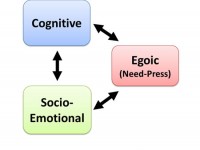Since 2015, webinars and courses at IDM have addressed the developmental structure of teams and central issues of team coaching. Specifically, they have clarified notions such as 'self organization' in teams and their ability to develop 'collaborative intelligence'. The perspective taken has been adult-developmental, to the effect that self organization of teams is anchored in the self organization -- thus the maturity -- of individual team members, rather than being a mysterious quality of whatever team. The perspective greatly differentiates interventions that make sense with teams from a merely behavioral vantage point. Team coaches need to address two dimensions of self organization: the social-emotional and cognitive one which broadly overlap and influence each other. The teaching of team coaching has been based on Laske's social-emotional team typology that distinguishes three levels of team maturity. On each of these levels, a team is either downwardly or upwardly divided as a function of the relative maturity of team minority or majority. Clearly, each such team necessitates taking a different approach to intervention. The attached set of slides details the CDF team typology. The typology distinguishes 6 types of teams, or 'We-Spaces', 3 of them up-, and 3 of them down-wardly divided. The... Read More...
Tag: Team Development
What Coaches Should Know About Their Clients
In these comments on my keynote read to the June 2015 EMCC conference in Warsaw, Poland, I summarize writings on developmental coaching from my pen since 1999. I have taught this discipline to an international student body between the years of 2000 and 2015 at IDM, the Interdevelopmental Institute, and continue to practice what I have learned in this domain in work with teams and circles. Although some of my articles on developmental coaching have appeared in international journals, to this day (2018) the coaching profession -- especially ICF coaching -- has not absorbed the empirical findings from research in adult development that are the foundations of my practice of evidence-based developmental coaching. Developmental coaching in terms of the IDM Institute I founded in 2000 entails that of the two English meanings of the term development one is "agentic", and the other is "ontic". The first meaning is expressed by a sentence such as "we develop a new team", while the second is referred to in the sentence "this team is immature". In the first case, one is thinking of individuals' development in behavioristic terms, focusing on what outsiders do to support (horizontal) learning, while in the second one focuses... Read More...
Zur Durchdringung organisatorischer Beratung mit Einsichten aus CDF
In diesem Artikel fuehre ich im Einzelnen die Geschichte und die Eigenart des Constructive Developmental Framework (CDF) aus. Ich moechte zeigen wie insbesondere ein soziologischer Beratungsansatz wie New Deal (Gucher 2015), aber auch aehnliche Beratungsvorgehen, durch Einsicht in die lebenslange Entwicklung von Menschen vertieft und im Dialog mit Kunden flexibel werden koennen. Der Nachdruck im Text liegt darauf, dass alle Dimensionen von Sozialkapital -- persoenliche Beziehungen, Emotionen, Aufmerksamkeit und Wissen -- in ihrer Bestehensweise und Verwendung entschieden von dem Reifegrad von Individuen und Teams abhaengen. Dies legt nahe, die auf New Deal beruhenden Interventionen durch sozial-emotionale und kognitive Werkzeuge aus CDF zu bereichern und dadurch zu staerken. Insbesondere erhoeht man durch CDF die Dialogfaehigkeit von Gruppen und Teams und staerkt das fuer eine kollaborative Arbeitsweise notwendige gegenseitige Vertrauen. Der Artikel behandelt sowohl wie man CDF durch Gruppenarbeit am Interdevelopmental Institute erlernt und wie man das erlangte Wissen in Kundenberatung und Coaching einfuehren kann. Anfragen ueber Lehrweise und Kosten der CDF Ausbildung zur dialogischen Beratung bitte an Otto Laske, otto@interdevelopmentals.org, richten. Durchdringung des New Deal mit CDF Feb. 2018 Read More...
Introduction to “Dynamic Collaboration: How to Strengthen Self-Organization and Collaborative Intelligence in Teams” (Jan De Visch & Otto Laske 2018)
This blog gives readers access to the Introduction to Jan DeVisch's and my book entitled Dynamic Collaboration: How to strengthen self organization and collaborative intelligence in teams, to be launched in May 2018 at the University of Antwerp, Belgium. In this book of five chapters, we deviate from the extant team literature by adopting an adult-developmental perspective and instead of "skills", "competences", and "agile" mantras and tool kits focus on the structure and quality of team dialog as the source of self-organization both in individuals and teams. We equate self-organization with being mature enough to be aware of the structure of one's emotions and thoughts as an expression of the level of one's adult development. To provide senior managers with new ways of thinking about teams and new kinds of interventions derived therefrom, we show that teams are always developmentally mixed -- composed of different developmental levels -- and dependent upon how team majority relates to team minority, are prone to being either up- or downwardly divided, rather than unified. We put at the disposition of senior managers a large set of tools unknown to them that derive from adult-developmental research at Harvard's Kohlberg School since 1975, showing them how... Read More...
NEW DEAL: A sociological consulting approach to humanistic management and deliberately developmental organization
This blog introduces a sociological approach to consulting to organizations, with a focus on social capital (Sozialkapital) as the indispensable foundation of value creation and social productivity. The approach, called New Deal, formulated in German (Gucher et al, 2015), is the fruit of new social science research, and is sponsored by Four Dimensions GmbH active in Vienna and Salzburg, Austria. New Deal represents a sociological approach in the sense that it sees work and value creation as a process by which social capital is constantly created as well as potentially destroyed in human interactions. To substantiate this insight New Deal introduces four "new economies" (not found in classical economy): of personal relationships, emotions, attention, and knowledge, respectively. According to this approach, managing the creation of social capital amounts to managing the four economies at all levels of an organization, whether it is hierarchical or not. The blog highlights what is fresh about New Deal in light of North American preferences for focusing on "getting the job done", or remaining in what CDF calls the "Task House". Reflecting on the New Deal approach from an adult-developmental perspective, the blog elucidates why "moving out of the Task House" is a requirement especially... Read More...
Transforming the ‘Human Resources’ Function into the Core of Humanistic Management: Potentials, Requirements and Obstacles
The topic of this abstract for a lengthy article is presently absent from the literature of 'humanistic management' (M. Minghetti 2014), namely, the limitations of human collaborative intelligence that naturally arise from the vicissitudes of adult development over the lifespan. (For example, at level 2 of meaning making (Kegan 1982), especially when accompanied by undeveloped resources for complex thinking (Laske 2008, 2017), levels of collaborative intelligence that can actually be reached are very low indeed.) Limitations of collaborative intelligence pervade every culture, not only of organizations. They define to what degree an organization has the potential to become effectively developmental, thus able of self-transformation. Such limitations, uncovered by empirical research since 1975, naturally arise from differences in emotional and cognitive maturity that distinguish individual collaborators one from the other. Although they are no longer a mystery for researchers, these limitations continue to be disregarded by those who formulate visions of humanistic management, a fact that diminishes the realism of such visions. Transforming the Human Resources Function Read More...


